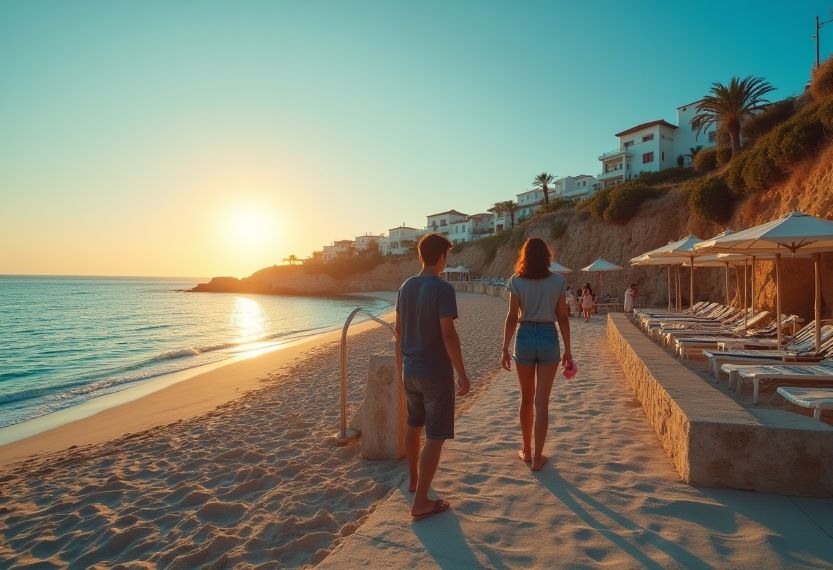Thursday, July 24, 2025
Along Portugal’s scenic southwest coastline, stretching from the charming town of Melides to Troia, there has been a significant change in the landscape. Once a home for local fishermen and low-key holidaymakers, this 45-kilometre stretch of coastline is rapidly transforming into an exclusive enclave for the ultra-wealthy. This shift is being fueled by a growing influx of international investors and affluent tourists, along with luxury resorts and private residences that are now outpacing traditional seaside accommodations. As a result, long-time residents are grappling with the consequences of these developments—rising costs, restricted access to beaches, and an erosion of their beloved local culture.
Restricted Access to Beaches
An inspection by the Portuguese Environment Agency (APA) has shown that nine out of the region’s 22 beaches are now off-limits. Some are privately managed by resorts, however, and for others access is directed through gated developments. At Galé-Fontainhas, for instance, visitors have to cross the grounds of Costa Terra, an upscale resort complex created by American investor Mike Meldman. These restrictions have sent up a red flag with local residents who can no longer get to the sand and surf without walking through private property or showing an ID at a security gate.
“A people who used to happily stroll barefoot to the sea are now prevented from doing so,” decries a local resident. The old pathways to the shoreline were long ago diverted or blocked, and parking is in short supply. As the city becomes increasingly exclusive, locals are left to ponder how long they will be able to hang on to their connection to beaches they have known their entire lives.
Rising Costs and Economic Strain
In places like Comporta, which was a quiet escape known for its rice paddies and barefoot style, prices have soared. Today, some properties command astronomical fees, hundreds of luxury homes can rent for up to €5,000 a night. This is meaning local workers are feeling more stretched as prices rise. “It’s ridiculous,” bemoaned one waiter at a nearby pizzeria. We can’t keep up.”
Not surprisingly, with property prices skyrocketing, the price of these beach amenities has followed. Visitors to the town who wish to hire a sunbed or parasol for the day are being charged as much as €200. This increase in prices is unaffordable for local people though, many of whom earn a fraction of the salaries of their wealthier counterparts.
In addition, there is simply too much demand for high-end apartments that many people who work there will go unsatisfied. Workers who live far away are spending hours on the road to get to the beach, and surf instructors can’t get access to the surf for lessons. What used to be a community-based, low-key scene has been besieged by rising costs and a change in the region’s identity.
Government Intervention and Regulations
In response to these mounting concerns, the Portuguese government has stepped in to address the growing tensions between local residents and the booming luxury tourism sector. Environment Minister Maria da Graça Carvalho has made a public commitment that no new tourist developments will be approved near beaches unless they guarantee public access. Carvalho’s statement reflects the government’s awareness of the increasing risks posed by unchecked private developments that limit access to the coastline, which is a public good in Portugal.
The government also has plans to regulate the prices of essential beachside services, including the rental of sunbeds, sun umbrellas, and even basic refreshments such as water and coffee. These initiatives are intended to keep the coastal areas affordable and accessible to both locals and tourists alike, ensuring that public access to the beaches remains intact.
Grassroots Movements and Local Activism
Despite these efforts by the Government, many locals feel that the changes are not sufficient to preserve their way of life. Grassroots movements, such as “Reopen Galé,” have emerged in response to the rise of exclusive developments. These groups are advocating for the restoration of free public access to beaches and the protection of local cultural identity. A protest has been planned for July 27 during the Atlantic UltraMarathon, to take place at Melides Beach, highlighting the issue and drawing attention to the impact of the luxury developments on the community.
Even some of the early adopters of the region’s upscale lifestyle are beginning to feel the effects of the changes. Christian Louboutin, the famed French designer who once praised Comporta as a “paradise,” has relocated further south to Melides. In an interview, he explained that he was seeking the authenticity that Comporta once offered, but which is now under threat. “People are touched by authenticity,” he said. “We need to preserve the region and avoid turning it into another St. Tropez.”
Both Development and Authenticity Are Being Neglected
The quickfire development along Portugal’s southwest coast has thrown up a quandary: how to reconcile the financial rewards of tourism with the imperative to protect the region’s culture and identity. As more luxury resorts transform the horizon, concerns about the long-term impact on the local community and environment grow sharper.
Government interventions, tightening beach access rules and price controls among them, are steps in the right direction, but they may not be sufficient to maintain the delicate equilibrium between development and authenticity. What happens next in this beautiful region will depend on how well authorities, and local communities, and developers can collaborate to develop a model for sustainable tourism here: one that respects the sensitive natural environment, and the lives of the people who have called it home for centuries.
But as locals in the region step up demands, questions linger over whether the government’s attempts will stave off the transformation of this once peaceful coastal strip into yet another swanky bolthole for the rich. The increasing awareness among the public, and heightened activism proposals that the debate about what will happen to this iconic part of Portugal is by no means finished.
